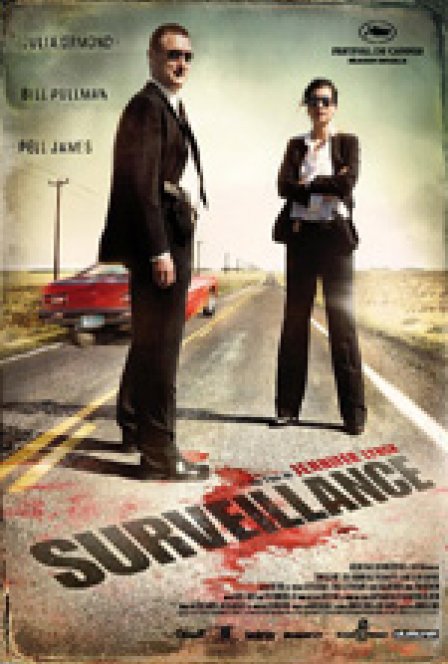Jennifer Lynch's Surveillance is a film about FBI agents investigating a brutal murder in a small town. Does this sound familiar? Well, it should. Jennifer Lynch is the daughter of none other than David Lynch, and this is essentially the plot of her father's acclaimed TV series, Twin Peaks. These things happen. In order to secure financing, Julie Delpy's 2 Days in Paris leaned on a plot that recalled Richard Linklater's Before Sunrise, the film by which U.S. audiences know its director best; Delpy was nonetheless able to create an original, appealing work within these confines. How does Ms. Lynch fare in a similar undertaking? Rather than using her father's template to create something new, she offers yet another hackneyed serial killer film.
Surveillance begins with quick flashes of its masked killers chasing victims. Agents Anderson and Hallaway (Julia Ormand and Bill Pullman, both David Lynch alumni) arrive in town shortly after and begin to piece together the events through a series of filmed interviews with the surviving witnesses: a junkie (Pell James), a corrupt cop (Kent Harper), and a small girl (Stephanie Bennett). Hallaway watches these interviews in real time on three monitors (hence the title). But the tapes' viewers may know more than is immediately evident.
The film's overall lack of originality is almost startling, enough to make one wonder if Lynch is not intentionally playing with generic clichés. Apart from the twist ending and killers in creepy masks, Surveillance features other such tired conventions as local police grumblingly dueling with federal agents over jurisdiction, a traumatized child drawing creepy pictures, and the suggestion that cops and criminals are not so far apart. But if Lynch is, in fact, playing with our genre expectations, the effect is garbled at best.
Is Lynch trying to create a film about the way we watch movies? The title would suggest this, as would Hallaway's private screening party. Lynch also makes reference to the effects of media on society: We see violence on TV shows, and the child witness watches disturbing news on a portable TV. But Lynch does not suggest that her culprits are in any way motivated by mass media – in fact, Lynch offers little to explain what drives them other than outside of the pleasure of the kill. If the murderers like to watch, we are never led to understand why.
There is a bizarre hint that the killers act as avenging angels. The cops that are killed are corrupt; the junkies are, well, junkies, who don't mind watching their dealer overdose; and it is even suggested that Stephanie's mother cheated on her biological father and may even have been involved in his death. However, if they are bringing justice to the wicked, Lynch again fails to clarify their motivation. Is society so morally bankrupt that only psychos can set it right? I don't know the answer, and by the time the credits roll, I no longer cared enough to be enlightened.

